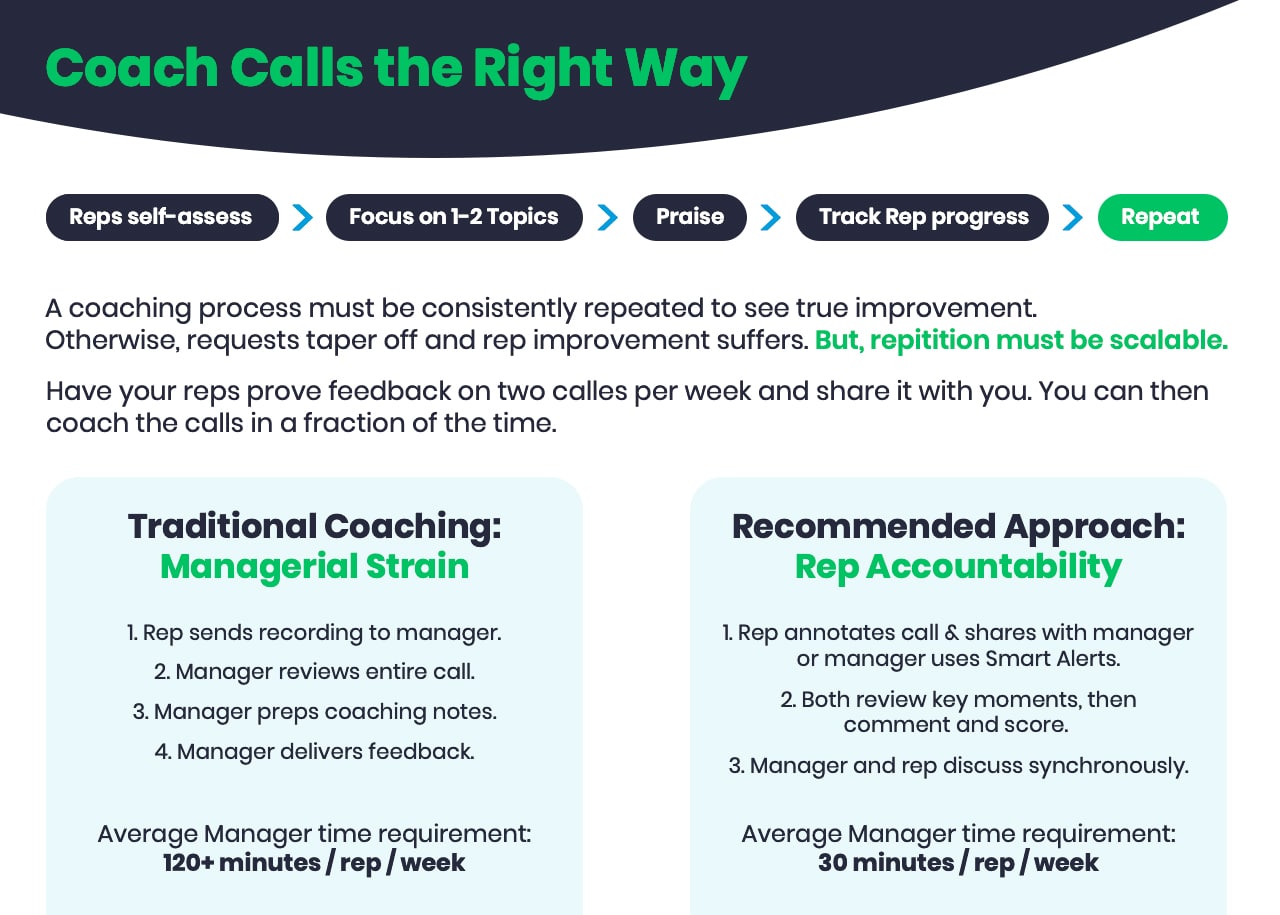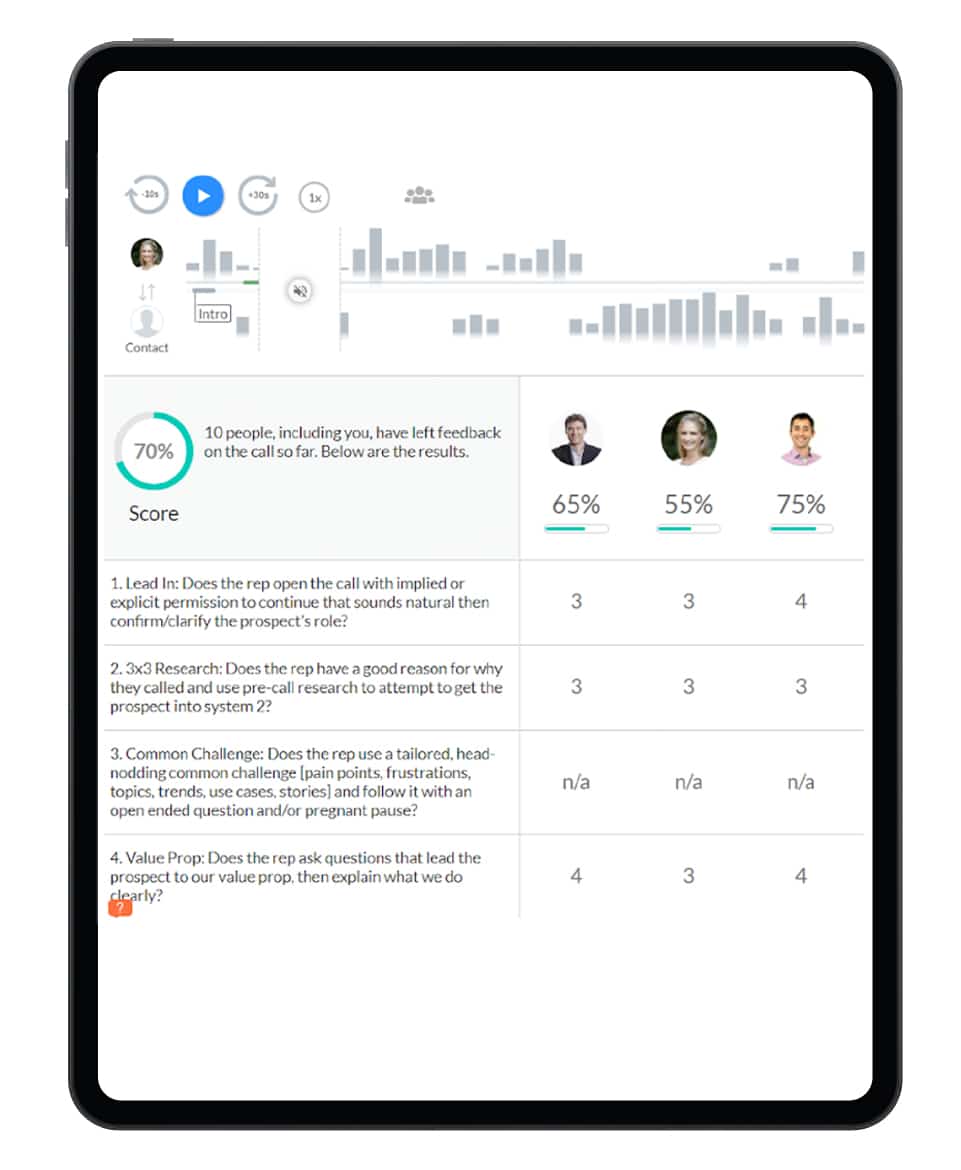A note from Mediafly: We will dive into how to optimize your sales coaching in a minute, but first (in case you missed it), we are excited to announce we have acquired ExecVision, a robust conversation intelligence solution that we will integrate into our Revenue360 platform. In addition to the powerful technology, the ExecVision team excels at developing sales teams at scale, driving behavior change, and ultimately generating more revenue through performance improvement. Today as we welcome the team, we’re excited to share their expertise.
According to ES Research Group, between 85% and 95% of sales training has no lasting impact after 120 days. While many organizations have a sales coaching program designed to give revenue teams feedback, most fail for one of these four reasons:
- Sales managers cannot observe or surface coachable moments
- Sales managers do not coach reps in a way that encourages them to self-correct
- There is no mechanism for rep or manager accountability in place
- There is no plan to teach sales managers how to coach reps effectively
You can’t mandate a coaching culture. You need to foster it. You need to nurture it. It evolves as your company grows and changes.
A coaching culture means reps crave feedback, frequently collaborate with teammates, and know where to turn to further develop their sales skills.
The #1 Thing Impacting Sales Coaching and Performance
Human behavior plays a critical role in impacting sales coaching and performance. You must first understand how your team behaves and where their skill gaps lie before you can make any significant changes.

Modifiable habits and skills range from updating workflows and processes to adjusting tone and inflection during calls. While some behavior changes need to happen at the organizational level, others should be tailored for individuals. The challenge is that most people don’t know or understand how to drive long-term behavioral modification. Instead, they rely on fun “facts” such as “It takes 28 days to build a new habit.”
If an organization seeks to create behavioral change that drives enduring performance improvement, its leaders need a general understanding of the science behind human action.
Tips to Modify Human Behavior
To learn new information and skills and modify behavior, humans need two things: repetition and sleep. These things help cement new neural connections in the brain that allow humans to retain information. While organizations have no control over how much sleep their team members get, they can control how frequently they review a particular skill or behavior via sales coaching and training.
It requires additional finesse to change group behavior. Herd mentality can be tough to overcome with vocal pessimists on the team. Leaders need buy-in from influential team members when introducing new behaviors, skills, and methods or an active sales coaching program. It is critical to explain the change, why it matters, the objective, and the impact on the business to both individuals and the group. Ideally, the team should understand, “What’s in it for me?”.
Unfortunately, many leaders go awry when they tell an individual or team to change a behavior or improve a skill. They communicate the desire for change but don’t check back on progress until they realize there has been no change and no performance improvement. Meanwhile, team members quickly revert to their old ways because it’s easy and comfortable. For modifications to stick long-term, they must be revisited, reinforced and recognized.
Sales managers also tend to overcoach, attempting to address five or six different skills, behaviors, or metrics in a single review. They try to address five or six different skills, behaviors, and metrics in a single review session, making it difficult for reps to know what to focus on and overwhelming them. Behavioral science research shows that focusing on one or two behaviors or skills in a session is ideal. The rep knows what to work on and has clear instructions for what changes to make.
How to Operationalize the Sales Coaching Process
You can’t measure what you don’t know.
A lack of information is one of the top barriers to creating an effective sales coaching program. As a leader, you should know how much sales coaching is happening, what type of coaching is happening, and whether or not it has a positive impact on sales performance. A conversation intelligence solution can help.
Mediafly acquired ExecVision because its solution shines where other Conversation Intelligence players fall short. ExecVision focuses on the most powerful tool in any revenue team’s arsenal: its people. In addition to surfacing actionable insights, the platform is infused with more than thirty combined years of sales training experience and proven social science that enables behavior change.

While most software companies train their customers on the product, the ExecVision team goes beyond that to educate users to deploy their revenue processes and methodologies across scorecards, keyword topics, training and onboarding, Coaching Plans, and more.

That is what helps companies go the last mile. It’s not a magic bullet or data analysis – it’s people helping people reach their highest potential. The tool – ExecVision – is a means to make that process easy and scalable. And it is now available as a part of Mediafly’s Revenue360 solution.
Contact us to learn more about conversation intelligence or the full Revenue360 product suite.

Comments are closed.